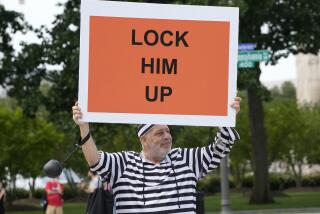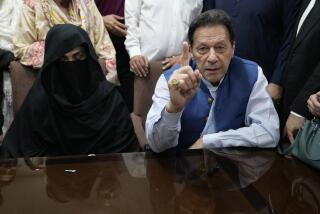With Bhutto in Jail, Anti-Zia Campaign Falters
- Share via
LANDHI, Pakistan — The Borstal Institution and Juvenile Jail houses 606 male prisoners, mostly young petty criminals and heroin pushers, and one woman.
Most of the prisoners sleep on the floor. The woman, Benazir Bhutto, 33, is allowed a cot in her 6-by-10-foot cell. Her food is cooked outside by family servants and brought in to her twice a day.
Otherwise, jail superintendent Rana Rasa said, she is treated just like any other prisoner at the jail in this dusty city 20 miles outside Karachi.
From Cote d’Azur to Jail
For Bhutto, leader of the Pakistan People’s Party and the daughter of former Pakistan Prime Minister Zulfikar Ali Bhutto, the jail is a far cry from her sprawling Karachi homestead or the elegant London and Cote d’Azur apartments where she lived, in exile, before she returned to Pakistan five months ago.
Bhutto could be released this week, but her arrest on Aug. 14 for defying a government ban on public meetings and her subsequent detention appear to have dealt a serious blow to her campaign to force elections and oust President Zia ul-Haq as ruler of the country.
“It has been a very bad setback for her,” said Hamida Khurro, a Karachi political scientist whose family is active in provincial politics here. According to Khurro and other analysts, Bhutto was drawn into confrontation with the Zia government too early, before her mass movement had a chance to fully coalesce.
“She has yet to transform a popular movement into a political movement,” attorney Kazim Hassan, a Bhutto supporter, said.
Previously, Bhutto had told reporters that she was seeking a showdown with the Zia government sometime later this year over her demand for elections this fall. Zia and his prime minister, Mohammed Khan Junejo, have refused to consider holding elections for the National Assembly until 1990.
However, Bhutto’s challenge peaked early after a day of protests that she called for Aug. 14 turned into a confrontation with Junejo, who had also called for a public meeting on the same day--Pakistan’s independence day. (Zia was on a pilgrimage to Mecca and avoided open involvement.)
To avoid a direct test of strength in the streets, which he probably would have lost, Junejo canceled his plans for a demonstration and called on Bhutto to cancel hers. When she did not, several hundred Pakistan People’s Party leaders were arrested. When she defied the government ban on demonstrations, she was also arrested in Karachi and then jailed in Landhi.
Pakistan government officials and opposition leaders, aware of the confrontational nature of Pakistan politics over the last 30 years, waited anxiously to measure and evaluate the demonstrations and protests that occurred in the wake of her arrest.
29 Die, 2,000 Arrested
More than 29 people have died and at least 2,000 have been arrested in the demonstrations, which continued last week with small protests in Karachi and Lahore, Pakistan’s two largest cities.
However, by Pakistan’s often bloody standards, the protests did not equal past efforts, including a 1983 period of agitation in Sind province, during which more than 200 people were killed.
And one senior Pakistan government official, a veteran of several military and civilian regimes, commented: “Most of the protests were in rural areas, not in the cities. Most were concentrated in Sind province (Bhutto’s home province). At the same time, there has been dissension in the Bhutto ranks, with almost all of her chief lieutenants leaving.”
The official was referring specifically to former People’s Party leader Ghulam Mustafa Jatoi, who announced in Lahore that he and other former Bhutto supporters have formed a new political party, the National People’s Party, to oppose both Zia and Bhutto. Jatoi, a rich, influential landlord from Sind, was the leader of the 1983 protest movement that was conducted while Bhutto was in London.
Meanwhile, several other leading opposition leaders, including the Northwest Frontier province’s leftist leader, Wali Khan, have withdrawn their support for Bhutto.
A Karachi high court last week paved the way for Bhutto’s release by overruling the government and ordering that she could be present Tuesday when the court reviews the government order for her detention.
When she does emerge from Landhi jail, Benazir Bhutto will probably remain the most popular opposition politician in Pakistan. “If a fair election were held today, I have no doubt that she would be elected hands down,” said Hamida Khurro.
However, the setbacks she has suffered in her plans to create a unified mass movement may have crippled or at least slowed her campaign to remove Zia.
‘Draw the Enemy Out’
“By flushing out her supporters early,” one political observer said, “Zia now knows where her strengths are. It was like a military operation--draw the enemy out and crush them.”
In fact, it is unlikely that the thin, handsome young woman, a graduate of Harvard and Oxford universities, enjoys the same degree of support that she did when she made her triumphant re-entry into Pakistan politics in Lahore last April.
At that time, returning after years of exile in Europe, she was welcomed by hundreds of thousands of Pakistanis, mostly passionate followers of her late father.
Emboldened by the masses, she boasted that a single word from her could bring down the Zia government. “The crowd was so responsive it would have done anything that I or my party directed,” she said after the greeting she received in Lahore on April 10.
For Bhutto, the campaign to remove Zia amounts to a vendetta. Zia, as Pakistan’s army chief of staff, overthrew her father in a 1977 coup and charged him with crimes. Two years later, after solitary confinement in prison, her father was executed by hanging.
More to Read
Sign up for Essential California
The most important California stories and recommendations in your inbox every morning.
You may occasionally receive promotional content from the Los Angeles Times.













